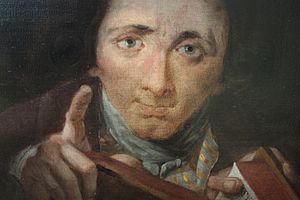John Brown (artist) facts for kids
John Brown (1752 – September 5, 1787) was a talented Scottish artist. He was known for his detailed drawings and portraits.
Contents
John Brown: A Scottish Artist
Early Life and Artistic Beginnings
John Brown was born in Edinburgh, Scotland, around 1752. His father was a watchmaker. John began his art studies in Edinburgh at a place called the Trustees’ Academy.
Around 1769, when he was about 17, he traveled to Rome, Italy. There, he became a student of another artist, Alexander Runciman. They quickly became very good friends.
Life and Work in Italy
John Brown lived in Rome for the next eleven years. During this time, he traveled around Italy and Sicily. He made many sketches of old, ruined buildings. These drawings were for people in Scotland who supported his art, like William Townley and Sir William Young. He also sent his drawings to the Royal Academy in London.
Brown often worked on smaller artworks. He liked to use pencils, pens, and wash (a type of diluted ink) for his drawings. Some of his famous drawings show everyday scenes, called genre scenes. An example is Two Men in Conversation (from around 1775–80). These drawings show the style of his friend, artist Henry Fuseli.
Return to Scotland and Later Years
In 1780, John Brown moved back to Scotland. Over the next few years, he drew many portraits of important people. He even created twenty-five portraits of members from the Society of Scottish Antiquaries. This group studied old Scottish history and objects.
From 1786 to 1787, he lived in London. While there, he showed his miniature portraits. These are very small, detailed paintings of people. John Brown returned to Scotland because he was not well. He passed away in 1787 in Leith, which is the harbor area of Edinburgh.
 | William L. Dawson |
 | W. E. B. Du Bois |
 | Harry Belafonte |


